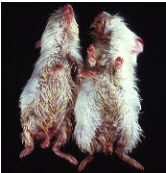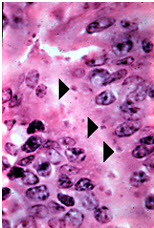Etiology: Cryptosporidium wrairi is a protozoan parasite.
Incidence: Cryptosporidiosis is fairly uncommon in guinea pigs.
Transmission: Transmission occurs by the fecal-oral route.
Clinical signs: Intestinal colonization by this organism may cause diarrhea, weight loss, pot belly, poor growth rates as well as perineal fecal staining in weanlings and juveniles.

Pathology: In the ileum there is evidence of blunted, fused villi, mild crypt hyperplasia, along with edema and a mild eosinophilic/lymphocytic infiltrate. Parasites can be visualized in parasitophorous vacuoles (arrowheads) at the apical portion of infected enterocytes.

Diagnosis: Fresh mucosal scrapings of the ileum with observation of the mature schizonts (4 µm in diameter) by phase contrast microscopy or by light microscopic exam of IFA stained wet mount preps (commercial kits are available) provides the most rapid method of diagnosis. Histopathologic exam of intestinal biopsies or PCR of mucosal scrapings are other methods for diagnosis of this condition.